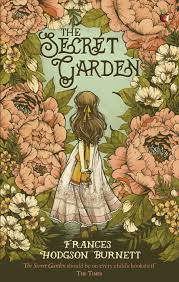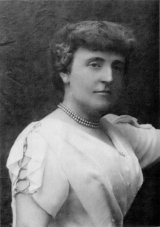The Secret Garden Page #15
The Secret Garden is a novel by Frances Hodgson Burnett first published in book form in 1911, after serialization in The American Magazine. Set in England, it is one of Burnett's most popular novels and seen as a classic of English children's literature. Several stage and film adaptations have been made.
Mrs. Medlock had allowed Martha to sleep all night at the cottage, but she was back at her work in the morning with cheeks redder than ever and in the best of spirits. “I got up at four o’clock,” she said. “Eh! it was pretty on th’ moor with th’ birds gettin’ up an’ th’ rabbits scamperin’ about an’ th’ sun risin’. I didn’t walk all th’ way. A man gave me a ride in his cart an’ I did enjoy myself.” She was full of stories of the delights of her day out. Her mother had been glad to see her and they had got the baking and washing all out of the way. She had even made each of the children a doughcake with a bit of brown sugar in it. “I had ’em all pipin’ hot when they came in from playin’ on th’ moor. An’ th’ cottage all smelt o’ nice, clean hot bakin’ an’ there was a good fire, an’ they just shouted for joy. Our Dickon he said our cottage was good enough for a king to live in.” In the evening they had all sat round the fire, and Martha and her mother had sewed patches on torn clothes and mended stockings and Martha had told them about the little girl who had come from India and who had been waited on all her life by what Martha called “blacks” until she didn’t know how to put on her own stockings. “Eh! they did like to hear about you,” said Martha. “They wanted to know all about th’ blacks an’ about th’ ship you came in. I couldn’t tell ’em enough.” Mary reflected a little. “I’ll tell you a great deal more before your next day out,” she said, “so that you will have more to talk about. I dare say they would like to hear about riding on elephants and camels, and about the officers going to hunt tigers.” “My word!” cried delighted Martha. “It would set ’em clean off their heads. Would tha’ really do that, Miss? It would be same as a wild beast show like we heard they had in York once.” “India is quite different from Yorkshire,” Mary said slowly, as she thought the matter over. “I never thought of that. Did Dickon and your mother like to hear you talk about me?” “Why, our Dickon’s eyes nearly started out o’ his head, they got that round,” answered Martha. “But mother, she was put out about your seemin’ to be all by yourself like. She said, ‘Hasn’t Mr. Craven got no governess for her, nor no nurse?’ and I said, ‘No, he hasn’t, though Mrs. Medlock says he will when he thinks of it, but she says he mayn’t think of it for two or three years.’” “I don’t want a governess,” said Mary sharply. “But mother says you ought to be learnin’ your book by this time an’ you ought to have a woman to look after you, an’ she says: ‘Now, Martha, you just think how you’d feel yourself, in a big place like that, wanderin’ about all alone, an’ no mother. You do your best to cheer her up,’ she says, an’ I said I would.” Mary gave her a long, steady look. “You do cheer me up,” she said. “I like to hear you talk.” Presently Martha went out of the room and came back with something held in her hands under her apron. “What does tha’ think,” she said, with a cheerful grin. “I’ve brought thee a present.” “A present!” exclaimed Mistress Mary. How could a cottage full of fourteen hungry people give anyone a present! “A man was drivin’ across the moor peddlin’,” Martha explained. “An’ he stopped his cart at our door. He had pots an’ pans an’ odds an’ ends, but mother had no money to buy anythin’. Just as he was goin’ away our ’Lizabeth Ellen called out, ‘Mother, he’s got skippin’-ropes with red an’ blue handles.’ An’ mother she calls out quite sudden, ‘Here, stop, mister! How much are they?’ An’ he says ‘Tuppence’, an’ mother she began fumblin’ in her pocket an’ she says to me, ‘Martha, tha’s brought me thy wages like a good lass, an’ I’ve got four places to put every penny, but I’m just goin’ to take tuppence out of it to buy that child a skippin’-rope,’ an’ she bought one an’ here it is.” She brought it out from under her apron and exhibited it quite proudly. It was a strong, slender rope with a striped red and blue handle at each end, but Mary Lennox had never seen a skipping-rope before. She gazed at it with a mystified expression. “What is it for?” she asked curiously. “For!” cried out Martha. “Does tha’ mean that they’ve not got skippin’-ropes in India, for all they’ve got elephants and tigers and camels! No wonder most of ’em’s black. This is what it’s for; just watch me.” And she ran into the middle of the room and, taking a handle in each hand, began to skip, and skip, and skip, while Mary turned in her chair to stare at her, and the queer faces in the old portraits seemed to stare at her, too, and wonder what on earth this common little cottager had the impudence to be doing under their very noses. But Martha did not even see them. The interest and curiosity in Mistress Mary’s face delighted her, and she went on skipping and counted as she skipped until she had reached a hundred. “I could skip longer than that,” she said when she stopped. “I’ve skipped as much as five hundred when I was twelve, but I wasn’t as fat then as I am now, an’ I was in practice.” Mary got up from her chair beginning to feel excited herself. “It looks nice,” she said. “Your mother is a kind woman. Do you think I could ever skip like that?” “You just try it,” urged Martha, handing her the skipping-rope. “You can’t skip a hundred at first, but if you practice you’ll mount up. That’s what mother said. She says, ‘Nothin’ will do her more good than skippin’ rope. It’s th’ sensiblest toy a child can have. Let her play out in th’ fresh air skippin’ an’ it’ll stretch her legs an’ arms an’ give her some strength in ’em.’” It was plain that there was not a great deal of strength in Mistress Mary’s arms and legs when she first began to skip. She was not very clever at it, but she liked it so much that she did not want to stop. “Put on tha’ things and run an’ skip out o’ doors,” said Martha. “Mother said I must tell you to keep out o’ doors as much as you could, even when it rains a bit, so as tha’ wrap up warm.” Mary put on her coat and hat and took her skipping-rope over her arm. She opened the door to go out, and then suddenly thought of something and turned back rather slowly. “Martha,” she said, “they were your wages. It was your two-pence really. Thank you.” She said it stiffly because she was not used to thanking people or noticing that they did things for her. “Thank you,” she said, and held out her hand because she did not know what else to do. Martha gave her hand a clumsy little shake, as if she was not accustomed to this sort of thing either. Then she laughed. “Eh! th’ art a queer, old-womanish thing,” she said. “If tha’d been our ’Lizabeth Ellen tha’d have given me a kiss.” Mary looked stiffer than ever. “Do you want me to kiss you?” Martha laughed again. “Nay, not me,” she answered. “If tha’ was different, p’raps tha’d want to thysel’. But tha’ isn’t. Run off outside an’ play with thy rope.” Mistress Mary felt a little awkward as she went out of the room. Yorkshire people seemed strange, and Martha was always rather a puzzle to her. At first she had disliked her very much, but now she did not. The skipping-rope was a wonderful thing. She counted and skipped, and skipped and counted, until her cheeks were quite red, and she was more interested than she had ever been since she was born. The sun was shining and a little wind was blowing—not a rough wind, but one which came in delightful little gusts and brought a fresh scent of newly turned earth with it. She skipped round the fountain garden, and up one walk and down another. She skipped at last into the kitchen-garden and saw Ben Weatherstaff digging and talking to his robin, which was hopping about him. She skipped down the walk toward him and he lifted his head and looked at her with a curious expression. She had wondered if he would notice her. She wanted him to see her skip.
Translation
Translate and read this book in other languages:
Select another language:
- - Select -
- 简体中文 (Chinese - Simplified)
- 繁體中文 (Chinese - Traditional)
- Español (Spanish)
- Esperanto (Esperanto)
- 日本語 (Japanese)
- Português (Portuguese)
- Deutsch (German)
- العربية (Arabic)
- Français (French)
- Русский (Russian)
- ಕನ್ನಡ (Kannada)
- 한국어 (Korean)
- עברית (Hebrew)
- Gaeilge (Irish)
- Українська (Ukrainian)
- اردو (Urdu)
- Magyar (Hungarian)
- मानक हिन्दी (Hindi)
- Indonesia (Indonesian)
- Italiano (Italian)
- தமிழ் (Tamil)
- Türkçe (Turkish)
- తెలుగు (Telugu)
- ภาษาไทย (Thai)
- Tiếng Việt (Vietnamese)
- Čeština (Czech)
- Polski (Polish)
- Bahasa Indonesia (Indonesian)
- Românește (Romanian)
- Nederlands (Dutch)
- Ελληνικά (Greek)
- Latinum (Latin)
- Svenska (Swedish)
- Dansk (Danish)
- Suomi (Finnish)
- فارسی (Persian)
- ייִדיש (Yiddish)
- հայերեն (Armenian)
- Norsk (Norwegian)
- English (English)
Citation
Use the citation below to add this book to your bibliography:
Style:MLAChicagoAPA
"The Secret Garden Books." Literature.com. STANDS4 LLC, 2024. Web. 25 Nov. 2024. <https://www.literature.com/book/the_secret_garden_427>.




Discuss this The Secret Garden book with the community:
Report Comment
We're doing our best to make sure our content is useful, accurate and safe.
If by any chance you spot an inappropriate comment while navigating through our website please use this form to let us know, and we'll take care of it shortly.
Attachment
You need to be logged in to favorite.
Log In